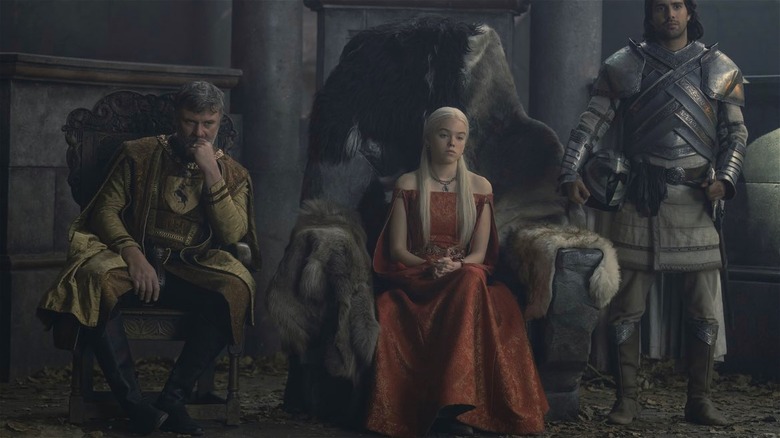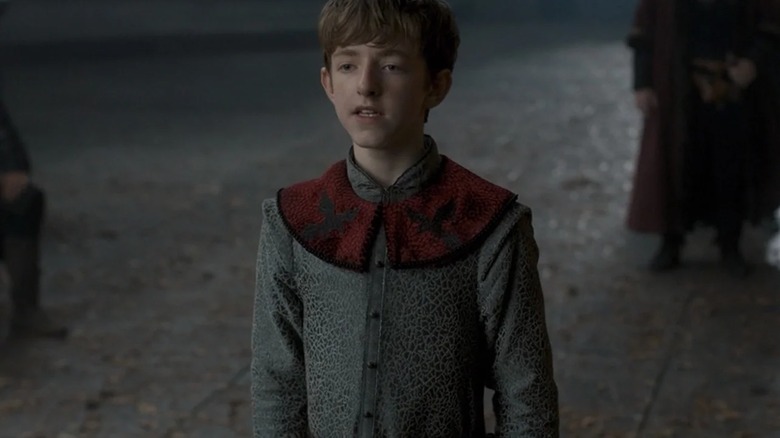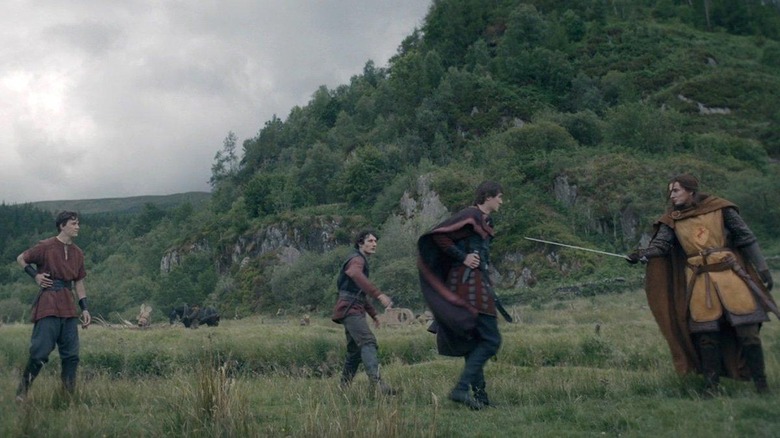House Of The Dragon Season 2: The Blackwood And Bracken Rivalry, Explained
This post contains spoilers for "House of the Dragon" and its source material, "Fire & Blood."
"House of the Dragon" season 2 has maintained a somber, grief-centered atmosphere so far. The unintended death of Lucerys (Elliot Grihault) had just begun to sink in, but tragedy struck again with the advent of Blood and Cheese, who beheaded a child without remorse, plunging King's Landing into chaos. Prince Jaehaerys' subsequent funeral helped stoke the embers of public resentment towards Rhaenyra (Emma D'Arcy), who is now branded as a "baby-killer," among other derogatory epithets by those vehemently against her. A demonstration of such a sentiment graces the opening of the season's third episode, where the Brackens instigate the Blackwoods, mocking them for their allegiance to Rhaenyra while boasting their own fealty to the "true king," Aegon I (Tom Glynn-Carney).
What ensues is hardly our first glimpse into the Blackwood-Bracken feud; "House of the Dragon" had already laid the foundation for this age-old, bitter rivalry in season 1. In the episode "King of the Narrow Sea," members of several houses vie for a young Rhaenyra's favor, including Willem Blackwood, a literal child who proposes an alliance between the houses, highlighting their stronghold on the Riverlands. As Rhaenyra doesn't take the proposal to heart, she politely declines, causing a jeering Jerrel Bracken to mock Willem in front of the court. A vicious brawl breaks out, prompting the young Willem to stab the battle-hungry Jerrel. As Jerrel dies, young Willem is repulsed by the viciousness of his own actions, causing him to hurl.
What are the roots of this unending cycle of violence between the two houses? Although no one knows for sure, "Fire & Blood" maps out the history of the respective houses, painting a bloody picture of senseless enmity, the primary cause having been long forgotten to time.
Why the Brackens and Blackwoods are at each others' throats
Neither the Brackens nor the Blackwoods are fledgling Houses, as their presence in Westeros can be traced back to before the arrival of the Andals. On closer inspection, the reason for their feud seems to be a classic case of communal prejudice, where the Blackwoods perceive the Brackens as petty usurpers unworthy of nobility, while the Brackens view the Blackwoods as those who betrayed them, despite being their vassals. Perhaps a look at "The World of Ice & Fire: The Untold History of Westeros and the Game of Thrones" can provide us with answers, although this companion guide states that the origins of this feud "are contested and shrouded in legend." George R. R. Martin also notes that the efforts to unite the two houses after centuries of bloodshed and rivalry were in vain:
"That they were both royal houses on the Trident seems true enough, and none can doubt that their enmity sprang from some cause, so entrenched that it has become legendary. Powerful as they were, they have maintained their feud despite the many kings who have attempted to make a peace between them. Even the Old King, Jaehaerys the Conciliator, failed in his attempt to halt this ceaseless war, for the peace he forged did not long outlast the end of his reign."
This seems like a noxious cycle with no end, where efforts of assimilation are thwarted from time to time due to fresh quarrels and an insistence to cling to the prejudices of their ancestors. Not even the political efforts of Aegon the Conquerer and Queen Visenya helped these houses arrive at a longstanding truce, and the impending Dance of Dragons will only make matters worse, as evidenced by this week's "House of the Dragon" episode.
The Dance of Dragons will deepen the divide between the two
Season 2, episode 3 highlights the futility of breaking such a never-ending cycle of hatred, as the Bracken-Blackwood fight escalates, leading to an all-out massacre. Bodies are dumped into the river, the cause being a ridiuclous brawl between young men eager to prove their respective allegiances to Team Green and Team Black. At some point in the episode, Princess Rhaenys (Eve Best) makes a crucial point: at this rate, no one can trace the impending war to its starting point, as the desire of those who wish to kill and burn will overpower logical or humane urges to broker for peace. In stark contrast, Aegon views the recent Bracken-Blackwood massacre as yet another skirmish in their centuries-long feud and wants to leverage it to solidify his influence over other houses (against the wishes of the Small Council).
Even the castellan of the now-scorched Harrenhal, Simon Strong (Simon Russell Beale), warns Daemon of the senseless nature of the recent massacre. "Sin begets sin begets sin begets sin," he quips while proposing that Daemon meet Grover Tully, the old Lord of Riverrun and Lord Paramount of the Trident, whom the Blackwoods are sworn to. Although machinations are still at a nascent stage, it is only a matter of time before houses faithful to either cause get caught in the line of fire in the name of fulfilling their duty to their sworn allies.
The Blackwoods will play a more important role further down the line thanks to a political marriage between Cregan Stark and Alysanne Blackwood (known as Black Aly) in the aftermath of the Dance of the Dragons. Until then, there's a long and bloody path etched for the two houses, which are forever eager to kill and main one another.
New episodes of "House of the Dragon" season 2 premiere Sundays on HBO and Max.


